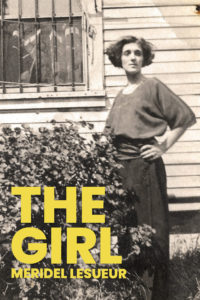Now Available!
THE GIRL by Meridel LeSueur
“Words should heat you, they should make you rise up out of your chair and move!” – Meridel LeSueur
The Girl transports us with resonant authenticity into the head of a young woman struggling to survive the depression of the 1930s in St. Paul, Minnesota. On a backdrop of state violence and poverty, and in a life shaped by desperation and gender-based violence, The Girl illustrates the ways working-class women keep each other alive and seed transformational change through self-organized systems of mutual aid.
“LeSueur seems in love with the spoken word, and her consummate achievement as an artist, I believe, is her transformation of colloquial speech into musical prose. In The Girl… common street talk turns into exquisite poetic refrains.” –Blanche Gelfant, The New York Times
Meridel LeSueur (1900–1996) is one of the great literary voices of the twentieth century, and The Girl is her most celebrated novel. In her own words, Meridel came from “abolitionists, agrarians, radical lawyers… dissenters and democrats and radicals through five generations.” Meridel was blacklisted in the 1950s because powerful men knew how dangerous it was to have proletariat working-class women writing their own stories. This is one of the stories they didn’t want you to read.
A new foreword by Margaret Randall—poet, translator, and social activist—and an afterword essay by one of Meridel’s great-granddaughters—locate the novel in a current social and political context.
Essays on The Girl
“Unshakable Belonging: Mutual Aid, Movement Ancestors, and Illuminating a Path Forward”
— Becka Tilsen
Note to Reader
This book is written in the vernacular of the era, with no quote marks.
What Readers Have Said
“Le Sueur seems in love with the spoken word, and her consummate achievement as an artist, I believe, is her transformation of colloquial speech into musical prose. In The Girl…common street talk turns into exquisite poetic refrains.”
— Blanche Gelfant, The New York Times
“Meridel Le Sueur’s work stands, urgent and unique, at that ‘bloody crossroads’ where politics and culture meet…Modernist literary experimentalism engages a distinctively feminist conception of how people defend themselves and organize for change.”
— Paul Lauter, A. K. and G. M. Smith Professor of Literature, Trinity College
